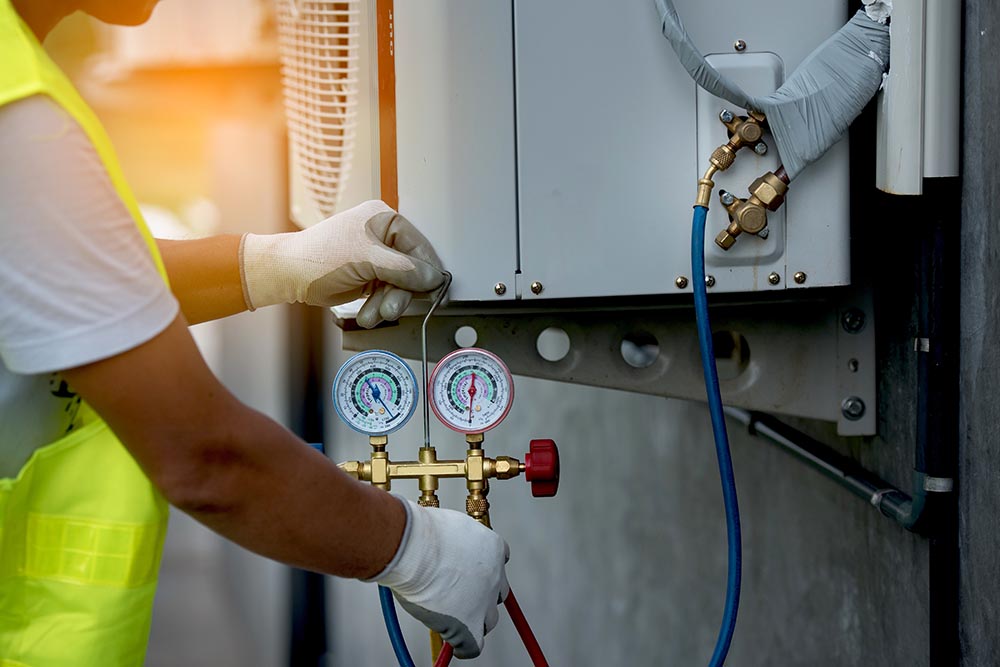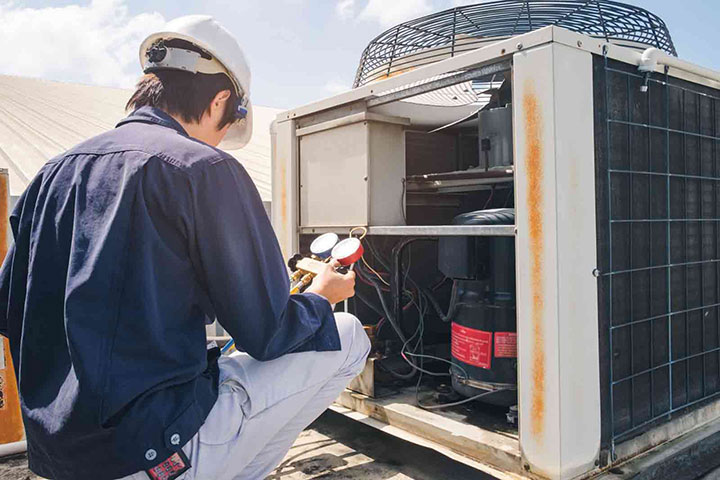Signs Your Home Needs Immediate heat pump service
Wiki Article
Choosing In Between a Heat Pump and Heater: Key Factors To Consider for Your HVAC Needs
When examining heating options for cooling and heating needs, the decision between a heat pump and a heater can be complicated. Each system provides distinctive advantages tailored to details climates and power efficiency objectives. Understanding these distinctions is crucial for making an enlightened option. Key factors such as installment expenses and environmental effect even more make complex the selection procedure. Which choice genuinely lines up with one's comfort and sustainability choices? The adhering to areas will explore these factors to consider thoroughly.Recognizing Warm Pumps: Exactly How They Function and Their Benefits
While numerous home owners think about numerous heating alternatives, recognizing exactly how heatpump function and their benefits can substantially affect their decision. Heatpump run by moving warm as opposed to generating it. In the wintertime, they remove warmth from the outside air or ground and transfer it indoors, while in the summertime, they reverse this procedure, cooling the home by removing heat outside. This dual performance makes them versatile for year-round environment control.One of the main advantages of warmth pumps is their power efficiency. They make use of considerably less electrical energy contrasted to typical home heating systems, possibly causing lower energy expenses (heat pump replacement ooltewah tn). Additionally, warm pumps have a smaller sized carbon footprint, making them an eco pleasant choice. They also require less maintenance than conventional systems, adding to lasting expense savings. In general, comprehending the technicians and advantages of heatpump can help house owners make informed decisions regarding their home heating and cooling requirementsChecking Out Heating Systems: Types, Procedure, and Benefits
Heating systems can be found in various types, including gas, electrical, and oil versions, each with distinctive functional mechanisms. Understanding these distinctions is necessary, as they influence efficiency and heating efficiency. In addition, heating systems offer many benefits, such as constant warm result and reliability in colder climates.Kinds of Heating systems
Furnace can vary substantially in style and procedure, with heaters being a popular selection among homeowners. There are several kinds of heating systems, each making use of various gas resources and technologies. Gas furnaces prevail, leveraging gas to produce heat effectively. Electric furnaces, on the other hand, use electric resistance to produce warmth, often preferred for their simple installation. Oil heating systems, while much less typical, are effective in locations with minimal gas access (heat pump service). In addition, condensing heating systems make best use of energy efficiency by recycling and recording exhaust gases. Each type runs through a system of heat exchangers and ductwork to disperse cozy air throughout a home. Comprehending the differences between these heater types is necessary for notified HVAC choicesAdvantages of Furnaces
For property owners looking for trusted heat throughout cold months, the advantages of furnaces are significant. Furnaces supply constant heating, making sure even temperature levels throughout the home. They are especially reliable in severe cool, typically outperforming heatpump in cold conditions. Various types, including gas, electric, and oil heating systems, supply flexibility to fulfill varied demands and preferences.Furnaces likewise often tend to have reduced initial installment prices compared to warm pumps, making them an extra accessible option for many. Their durable style adds to a longer lifespan, with lots of devices lasting over 15 years with appropriate upkeep. In addition, contemporary heating systems are usually outfitted with innovative modern technology for boosted effectiveness, which can cause minimized energy bills. Overall, heaters stay a reputable choice for effective home heating.
Energy Effectiveness: Contrasting Warm Pumps and Furnaces
When contrasting power performance between heat pumps and heating systems, the Seasonal Power Efficiency Ratio (SEER) plays a crucial role in establishing efficiency. Additionally, a functional cost analysis exposes the long-term monetary effects of each system. Recognizing these factors can assist homeowners in making informed decisions concerning their home heating remedies.Seasonal Energy Effectiveness Proportion
Power performance plays a vital role in the decision-making process between heatpump and heating systems, particularly when taking into consideration the Seasonal Power Performance Proportion (SEER) This metric actions the cooling effectiveness of heatpump over a whole air conditioning season, providing a standard method to assess performance. Higher SEER ratings indicate greater energy performance, converting to lower energy consumption and minimized energy expenses. On the other hand, furnaces are typically assessed making use of the Yearly Gas Use Efficiency (AFUE) rating, which reflects home heating effectiveness. When comparing these 2 systems, homeowners need to focus on SEER rankings for heatpump, as they straight impact total energy cost savings and ecological sustainability. A thorough understanding of SEER can significantly influence the long-term contentment and cost-effectiveness of the picked heating and cooling remedy.Functional Cost Evaluation
Understanding the operational costs linked with heatpump and heating systems is crucial for property owners evaluating their options. Heatpump typically supply greater power performance, converting electrical power into warmth with minimal waste. This results in lower month-to-month energy costs, particularly in modest environments. On the other hand, traditional heaters, especially gas designs, might have reduced ahead of time prices but can incur greater operational expenditures over time as a result of fuel rates and effectiveness ratings.Moreover, heat pumps can work as both heating and cooling systems, possibly lowering the need for separate a/c systems. While preliminary investments for warm pumps may be greater, their lasting savings in power efficiency can make them a much more cost-effective option for lots of households. Careful analysis of regional energy rates is vital to identify the finest alternative.Installment Costs: What to Anticipate for each and every Furnace
Installment expenses for furnace can differ considerably between heatpump and heating systems, influencing property owners' decisions. Warm pumps normally have higher upfront installment expenses, usually ranging from $3,500 to $8,000, relying on the system dimension and intricacy of installation. This includes the exterior device, interior handling system, and essential ductwork alterations. Alternatively, heaters often tend to have reduced preliminary costs, averaging in between $2,500 and $6,000, which can be appealing for budget-conscious homeowners. Installation expenditures can boost if comprehensive ductwork is required.Moreover, the option of fuel kind for heaters-- natural gas, propane, or electrical-- can also affect installation prices. While heat pumps provide energy efficiency, their initial financial investment may deter some buyers. Inevitably, examining installation prices alongside long-lasting cost savings and effectiveness will certainly assist house owners in making educated choices about their heating unit.Climate Factors To Consider: Which System Does Better in Your Location
Exactly how do environment problems affect the performance of heater? The performance of heat pumps and furnaces can differ substantially relying on the regional climate. In modest climates, warm pumps excel by successfully transferring warm from the outdoors air, making them an energy-saving option. Nonetheless, their efficiency decreases in exceptionally chilly temperature levels, see this page where they might struggle to remove sufficient heat. Conversely, furnaces, especially gas designs, supply dependable and consistent warmth regardless of outside conditions, making them more suitable in colder regions.In locations that experience milder winter seasons, heatpump can run properly year-round, providing both home heating and air conditioning. On the other hand, regions with rough winter seasons commonly profit from the toughness of heaters. Inevitably, recognizing the regional environment is necessary when deciding in between a heatpump and a furnace, as it directly influences their operational effectiveness and general performance.Maintenance Requirements: Long-Term Look After Warm Pumps vs. Furnaces
While both heatpump and heaters require regular upkeep to assure peak efficiency, their certain needs and treatment regimens differ significantly. Heaters usually need less regular focus, with yearly evaluations sufficing to look for gas leaks, clean filters, and assess total performance. Their less complex layout frequently enables simple repairs.In comparison, heatpump necessitate semiannual upkeep due to their twin role in cooling and heating. This consists of cleaning coils, inspecting cooling agent levels, and making certain that both the outdoor and indoor systems operate at their finest. Furthermore, heatpump maintenance usually includes even more intricate elements, making professional servicing essential.Neglecting maintenance can result in diminished efficiency and raised energy prices for both systems. Ultimately, house owners should take into consideration these long-lasting care needs when selecting between a warmth pump and a heating system, as proactive upkeep can expand the life-span and performance of either system considerably.Environmental Effect: Picking a Sustainable Heating Option
The environmental effect of heating systems is a crucial analysis for house owners seeking sustainable alternatives. Warm pumps are normally a lot more energy-efficient than typical heating systems, as they move warmth as opposed to produce it, greatly reducing carbon emissions. By utilizing renewable resource resources, such as geothermal or air-source heat pumps, home owners can additionally reduce their environmental footprint.On the various other hand, natural gas furnaces release greenhouse gases and add to air pollution, though they typically supply greater warm output. However, innovations in modern technology have caused the growth of high-efficiency heaters that reduce emissions.Ultimately, selecting a home heating system involves weighing effectiveness against environmental influence. Homeowners are encouraged to reflect on regional power resources and incentives for eco-friendly systems, making certain a selection that aligns with both individual convenience and ecological responsibility. The choice impacts not only prompt comfort yet likewise lasting sustainability and ecological health.Regularly Asked Concerns
The Length Of Time Do Heat Pumps and Furnaces Typically Last?
The life expectancy of heatpump usually varies from 15 to twenty years, while heaters can last between 15 to three decades. Regular maintenance significantly influences their durability and effectiveness in giving home heating options.Can I Use a Warmth Pump in Extremely Cold Climates?
Warmth pumps can run in extremely cold environments, yet their efficiency decreases as temperatures decrease. In such problems, additional heating resources may be necessary to preserve comfy interior temperature levels and guarantee peak efficiency.
What Is the Noise Degree of Warmth Pumps Versus Furnaces?
The noise degrees of heatpump and heating systems differ considerably. Normally, heatpump run even more quietly than traditional heaters, making them better for those delicate to sound, while furnaces might create louder functional noises throughout home heating cycles.
Are Heat Pumps Suitable for Both Cooling And Heating?
Heatpump are undoubtedly appropriate for both heating and air conditioning (furnace replacement). They work by moving heat, giving efficient temperature control year-round, making them a original site versatile choice for homeowners seeking an all-in-one heating and cooling remedyWhat Size Home Heating System Do I Required for My Home?
Identifying the ideal dimension heater for a home needs examining factors such as square video, insulation quality, neighborhood environment, and the home's design. Consulting a professional you could try these out can ensure an exact analysis and ideal convenience. Warm pumps commonly offer greater energy efficiency, transforming electrical power into heat with very little waste. In modest environments, heat pumps stand out by successfully moving heat from the outdoors air, making them an energy-saving alternative. Conversely, heaters, especially gas models, offer consistent and reliable warmth no matter of outside problems, making them preferable in colder regions.In locations that experience milder winters months, heat pumps can operate properly year-round, supplying both heating and cooling. Warm pumps are typically extra energy-efficient than typical heaters, as they move warm rather than produce it, significantly lowering carbon emissions. By making use of renewable energy sources, such as geothermal or air-source warm pumps, home owners can additionally reduce their environmental footprint.On the various other hand, natural gas furnaces send out greenhouse gases and contribute to air pollution, though they usually offer greater warmth output.Report this wiki page